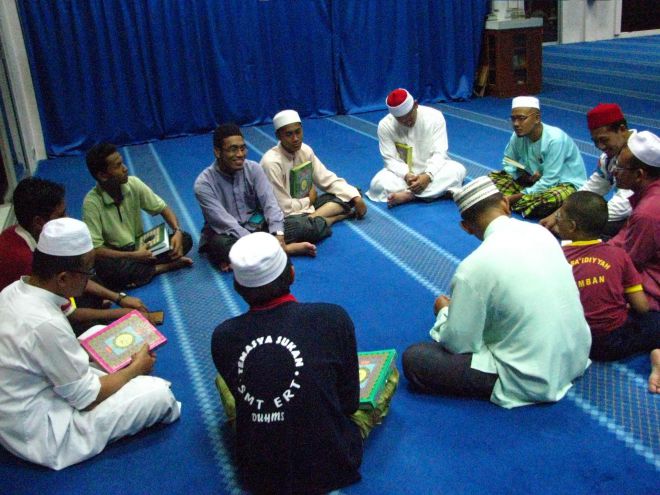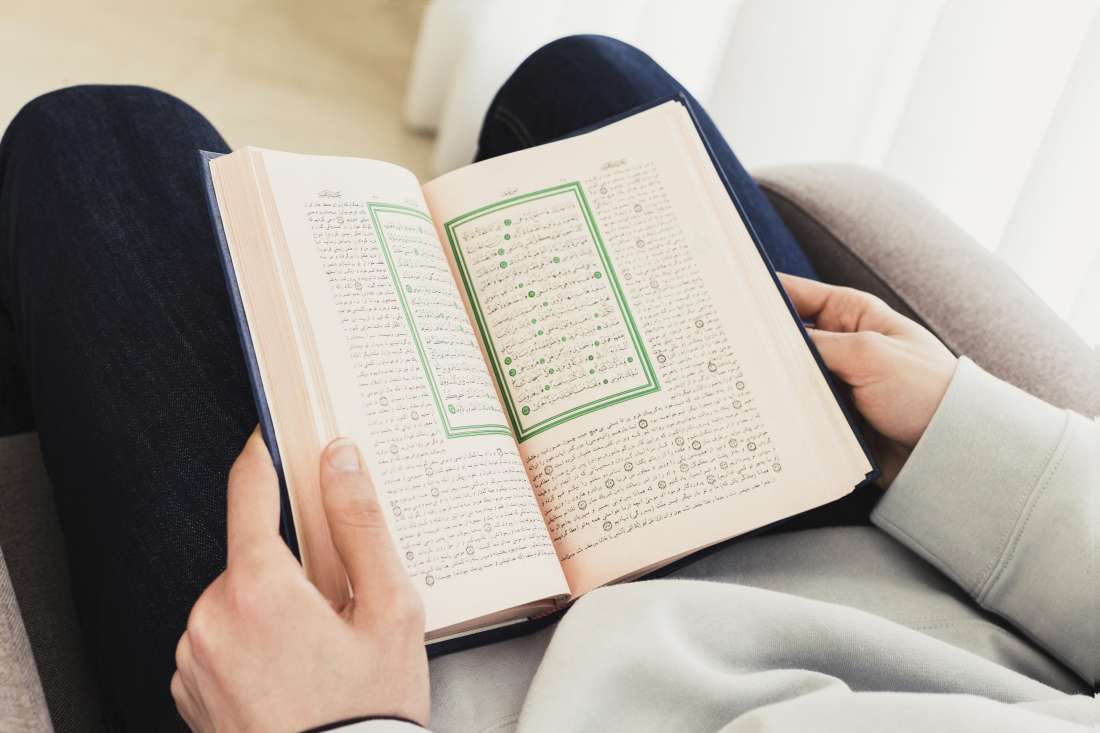Your journey through the Quran requires that you seek and join a community of quest and study.
No doubt you will read the Quran individually. But your benefits will multiply if you join in fellowship with other believers and seekers after the Quran.
In companionship, the states of the heart may be intensified. Many minds joined together may understand meanings better and more correctly.

Too Busy to Recite Quran... What to Do?
And, only by joining with others can you live fully the lives inspired by the Quran and discharge the mission that reading it enjoins upon you.
By acting and fulfilling that mission you will deserve to be admitted to the fullest possible blessings of the Quran.
Significantly, the Quranic address is almost always collective. And the Prophet (peace and blessings be upon him) from the moment he received the revelation of the Quran, set out to create a community with the Quran at the center of its life, and spent every moment of his life in this effort.
The instruction to ‘read’ was followed, in time, by the command to ‘arise and warn’.
The instruction to continue to {read what has been revealed to you in the Book of your Lord} is immediately followed, contextually, with the instruction to ‘bind yourself with those who call upon their Lord at morning and evening, desiring His countenance, and let not your eyes turn away from them’ (Al-Kahf 18: 27-28).
These Quranic teachings clearly and forcefully establish the link between its reading and the need for a strong, closely-knit community rooted in that reading.
Again, no Prayer can be complete without reading the Quran, nor, if it is obligatory and there is no genuine excuse, without fellowship with others (Jama`ah).
What is the purpose of reading the Quran in Prayer if not to hear it, understand it and ponder over it? Thus five times a day this purpose should be accomplished in collective endeavor.
The duty to communicate the message of the Quran to the whole of mankind also entails that the Quran should be read and explained corporately. The word tilawah, when used with the Arabic preposition `ala, means to communicate, to propagate, to spread, to teach.
To do the tilawah in this way is one of the basic functions of the Prophethood, and, therefore, of his Ummah (Al-Baqarah 2: 129, 151). In Surat Al-Jumu`ah (62), failing to understand and live by Divine guidance is emphasized in the context of failing to stay with the Friday Prayer for which every worldly activity must be given up.
The Quran also hints at the reading of the Quran in families and homes in the following verse: {And remember that which is recited in your houses of the revelations of God and the Wisdom} (Al-Ahzab 33:34).
Those who gather together to read and study the Quran are blessed because upon them descend the angels with God’s abundant mercy, as the Prophet (peace and blessings be upon him) said:
“Whenever people gather in one of the houses of Allah for reading the Quran and teaching it to one another, peace descends upon them, mercy covers them, angels spread their wings over them, and Allah mentions them to those around Him.” (Muslim)
So you should not be content with reading and studying the Quran alone, but should set out to find other seekers and invite them that you may do so together.
Forms of Collective Study

Collective study may take two forms:
One: Where a small group gathers to study and deliberate upon the Quran so that each participant takes an active part in the process, though some among them may be more knowledgeable than others and one will lead the study. This we shall call Halaqah, or Study Circle.
Two: Where a group, small or large, gathers to study the Quran by actively listening to the exposition given by a knowledgeable person. The participants only raise questions. This we shall call ‘Dars‘, lesson or lecture.
You should know how a Study Circle should be conducted and how to prepare and deliver a Dars. Here we can discuss only very broad guidelines.
Again, it is important to remember that there can be no standard, fixed procedures. Each person or group will have to develop his or their own method, and each situation will have to be treated on its own. The guidelines given below are only suggestions which you should adapt to your requirements and capabilities.
Four Basic Rules

Four rules are basic to the success of any collective study:
One: You must always make all the preparations necessary to fulfil your responsibility.
Do not take your task lightly. Do not postpone your preparation till the eleventh hour.
Do not consider a quick glance enough, never say anything about the Quran without having given it full consideration.
It is always better to make note of what you have studied and what you want to say.
Two: Whether you are a novice or you already possess some knowledge, whether you have to give Dars or participate in discussion in a circle, undertake a study on your own of the selected part, broadly in line with the procedure described earlier.
Three: Always keep your niyah (intention) right, that is, understand and live the Quran in order to seek Allah’s pleasure.
Four: Do not study together merely for pleasure, intellectual curiosity, or argument and discussion. Your studying the Quran together must result in your obeying the Quran together and fulfilling the mission it entrusts to you.
To be continued.
References
Taken with slight modifications from the author’s Way to the Quran.
The post Why It Is Important to Study Quran Collectively appeared first on About Islam.
source https://aboutislam.net/shariah/quran/recite-memorize/why-it-is-important-to-study-quran-collectively/

No comments:
Post a Comment